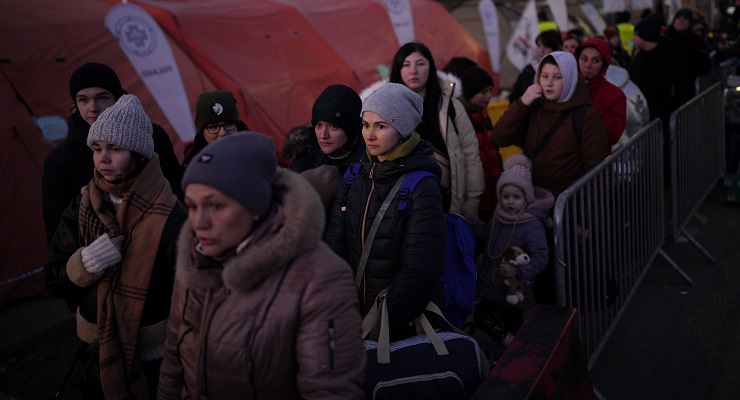
Strange how poor our business leaders and politicians are at any sort of lateral thinking. A bold gesture to address one of Australia’s major economic challenges is staring us right in the face, but we’re so silo-bound in our thinking we can’t grasp it.
Currently over a million Ukrainians have fled Russia’s sickening invasion. Other countries — with the notable exception of post-Brexit Britain — are opening their doors to Ukrainians. Here, the Morrison government has only said priority will be given to fleeing Ukrainians, and 3000 visas have been approved so far.
Meanwhile business constantly urges an increase in both temporary and permanent migration to address workforce shortages, with unemployment at 4.2%, major workforce sectors like aged care shrinking when we need them to be rapidly expanding, and even the government flagging it needs to find 20,000 extra defence personnel in the next decade and a half.
But as Crikey’s Amber Schultz reported last week, the small number of Ukrainians who have so far reached Australia are being given tourist visas.
There’s much to be learnt from Canadian Prime Minister Justin Trudeau, who has thrown Canada’s doors open to as many Ukrainians as it can take. A similar Australian gesture — say, a pledge to welcome 100,000 Ukrainians as permanent migrants in a special visa class for victims of the invasion — would be a worthwhile permanent expansion of our labour force, reducing the reliance of business on easily exploited temporary workers. It would also go some small way to restoring Australia’s dismal reputation for hostility to refugees.
While the majority of Ukrainians fleeing the invasion — like refugees from all conflicts — want to go home once peace is restored, the likelihood of Russian domination of Ukraine when the invasion is finally successful, or the installation of a puppet regime in Kyiv in thrall to Putin’s gangsters, will likely encourage Ukrainians to stay away — most likely in Europe, where so many have family or cultural ties, or where they have studied or visited. The risk to Ukraine is the continued flight of its best and brightest, but that can be the problem of Putin and whichever proxies it installs in Kyiv.
But many might like to move to somewhere warmer, where employment is plentiful.
Like every other developed country with an ageing population, Australia faces a long-term challenge of finding a labour force. Relying on temporary migration to fill the gaps is a self-defeating solution in an environment in which labour will grow increasingly scarce.
If about half of the hundred thousand migrants wanted to join the workforce, it would only add around 50,000 people a workforce of over 13 million — so unlikely to push down wages noticeably, while as permanent migrants they would provide the economic benefits long touted by advocates for higher immigration in terms of increased demand. They would become a new story in Australia’s migration history, another reason to boast of our success as a multicultural society.
So where is the business lobby, calling for Australia to take as many Ukrainians as it can? Where are the calls in the Australian Financial Review for the government to throw open our borders to address the nightmarish shortage of workers? Where are the business supporters of refugees, like Tony Shepherd and Innes Willox who — to their immense credit — travelled to the Middle East, saw first-hand what was happening, and called for Australia to take in Syrian refugees in 2015?
It’s time for Australia to open its doors. It’s the humanitarian thing to do, and makes good business sense too.








Unlike some other highly deserving & desperate refugees for whom recent Oz governments have created a living hell, the Ukrainians are Christian. I’m guessing that’s the qualification to warrant protection.
But we should resolve current outstanding refugee cases first. Pronto, it could be done overnight.
Christian and White ‘zut’
Indeed, the magic combination.
What happened to all those Afghans who needed a new home? Afghans have always been great settlers and we owe them.
I thought the problem with aged care was that it was under-funded and too much was being siphoned off to profit. Plenty of people in Oz who would do that work if it was secure and well-paid with good working conditions.
Like most things with this Commonwealth Government – being able to see a picture outside there own personal interests is beyond them.
I would be more welcoming of permanent immigrants joining our workforce and building our society, than the same number of tourist and backpacker workers being used to erode our living and working conditions. On past experience, European migrants do seem to add positively to our society.
Permanent migrants at least have a stake in continued good wages & conditions unlike the half million dodgy visa scamsters of the last 20yrs who see even stolen wages as better than they’d find in their home countries.
Oh, so it’s the workers who are the problem? Who knew? I thought it was the dodgy businesses paying them peanuts and the dodgy labour hire companies ripping them off.
Dochoo reed no good?
NB ‘stolen wages’.
I agree with your comment up to the point where you mention European migrants adding positively to the society. As opposed to… what – Asians? What about South Americans? New Zealanders? Seriously, please, think.
I find it extremely distasteful the support for Ukarinians because they are white, largely Christian and being invaded by a Russian psychopath. On the other hand, we invaded Afghanistan and then ran away leaving the country devastated and abandoning coloured Muslims who supported Australians while we were trashing their land. Get a grip.